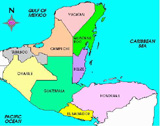
Micronationalism
The story of Sealand sounds too fascinating to be true. If it's true, it must be unique, I thought at first. But - I was wrong. A GeoCities newsletter pointed my attention to a virtual country that exists only on the Net, the Aerican Empire. From there I tracked down more than 50 other virtual countries and related websites. These imaginary countries are called Micronations. But the term Micronation can also stand for real small territorities that are quasi-independant or struggling for independence. Thus defines Steven F. Scharff in his Micronation and Sovereignty Website Index:
"A 'micronation' is any number of things:
...a model country that exists solely as work of fiction.
...a small group of people who are seeking sovereignty from another governmental power.
...a collection of brave souls who are trying to establish a new country.
...a tiny sovereign jurisdiction that may have escaped the notice of other major powers."
Although Sealand is, perhaps, the most successful example of a Micronation, it is just one of many. According to the Index, other examples of small de facto souvereign areas and souvereignity projects in the real world are Hutt River Province Principality, located on an Australian wheat farm, and the Free City of Christiana, based on a former army base in Copenhagen, Denmark.
More "serious" cases can be found at the website of the UNPO (Unrepresented Nations and Peoples Organisation), a organization with 52 members such as Chechnya, Taiwan, East Timor, Australian Aboriginies and Tibet. Five ex-members of this organization - Belau and four former Soviet Republics - have already been recognized as independant states and have joined the UNO.
However, what's the sense of virtual, Net-based countries? Again from Steven's site:
"Model Countries and Micronations
These are model countries that function as either:
- large-scale role playing games.
- phantom countries complete with fictional cities and armies.
- exercises in governmental protocol (often compaired to "diplomatic model railroads").
- exercises in historical and/or cultural interest.
- artistic or social statements.
Some are run by groups of people, others by individuals.
Some have plans for actual territorial claim in the future, while others are simply maintained as entertainment, or to make a social comment."
If you're looking for fictional countries in particular, the Micronation and Sovereignty Website Index is also a great place to start. Other good sites on this topic are the World Micronation Union and, for German-speaking micronations, the United Virtual Nations Organization.
 Many of these virtual countries are nothing more than several html and jpg files, but these websites are often dynamic and interlinked. Most of the time you can apply for free citizenship, take part in elections, become a minister or discuss laws on mailinglists as a member of parliament. As a diplomat you can take care of the relations with other virtual nations, create allies or declare war on them.
Many of these virtual countries are nothing more than several html and jpg files, but these websites are often dynamic and interlinked. Most of the time you can apply for free citizenship, take part in elections, become a minister or discuss laws on mailinglists as a member of parliament. As a diplomat you can take care of the relations with other virtual nations, create allies or declare war on them.
It's a bit like games such as Sid Meier's Civilization. But unlike traditional computer games, the rules are not fixed by a program. You can virtually do anything, provided it's accepted by the other participating people.
If you want the game to go off according to clearer rules, you may try ImagiNations. Each player is assigned a small part of a virtual map where he can build his country. The country itself is, again, represented by a website. By means of email and a public mailinglist, the players can freely interact with each other. Wars, however, are supervised by the PlanetMaster, who will decide the winner of each battle by a formula. Treaties which affect territority must be published on the websites of the involved partner nations.
I'm positively surprised at the complexity of some virtual countries' constitutions and "historical" data. A few micronations, such as Alphistia, even have their own languages with up to 2000 words. Some other countries, like Bananaworld (only available in German at the moment), mainly stand out due to original and funny graphics. Whether serious or not, the creators of such micronations really invest a lot of effort in them, but after trying to make a (yet unreleased) micronation myself I can say it's really fun. Just like watching these creative sites!